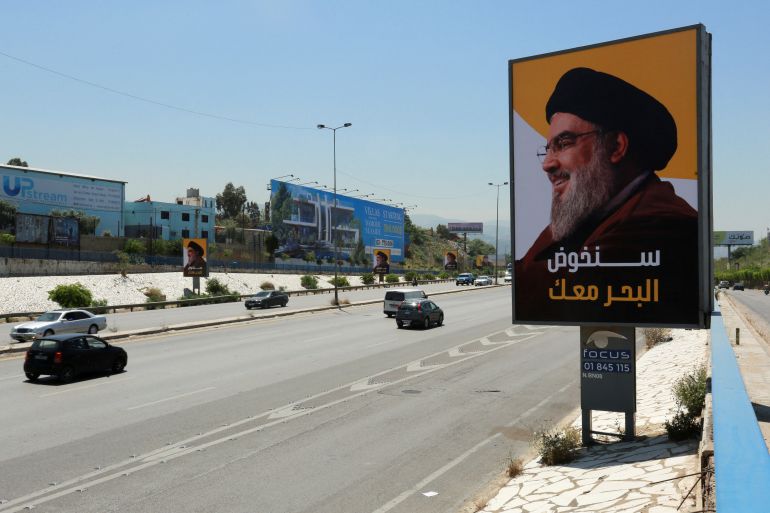Post-election calm prevails in Beirut’s divided neighbourhoods
A fragile calm persists in Beirut’s Ain el-Remmaneh area, home to longtime rival parties that are now key players in the Parliament of Lebanon.

Beirut, Lebanon – It seems eerily calm in one of Beirut’s most contentious front-line neighbourhoods just days after Lebanon voted for a new parliament.
The white flags of the Christian Lebanese Forces party hang along streets throughout the Ain el-Remmaneh neighbourhood, which overlooks the Shia majority area of Chiyyah, where streets are decked out in the green and yellow flags of the Hezbollah and Amal parties.
Keep reading
list of 3 itemsLebanon votes with cautious hope election can bring change
Lebanon’s elections will only re-legitimise the failed system
During Lebanon’s civil war that ended in 1990, this area was a flashpoint of tension between the warring factions, and remains to this day a stark reminder of the worst of Lebanon’s sectarian divisions and strife.
In the days leading up to the election on Sunday and before the results were announced, Lebanese government troops and armoured vehicles were deployed at the Tayouneh roundabout that divides the two neighbourhoods. The army had orders to deter supporters from carrying out provocative actions.
Now the parties representing both communities here are the main players in the formation of a new parliament in Lebanon. How the leaders of the two parties choose to move forward will determine whether economic recovery is on the horizon for the country – or yet more political paralysis, sectarian tension, and possible panic.
Samir Geagea, the Lebanese Forces leader, seems to be in no mood to compromise.
He now has the largest Christian bloc in parliament and, according to him, the anti-Hezbollah camp was the winner in Sunday’s vote.
Geagea claims there is a “new majority” of anti-Hezbollah lawmakers, consisting of both anti-establishment newcomers and traditional parties who for decades have opposed the Iran-backed party.
“The majority is now in another place, not one party, not one grouping,” Geagea said in a speech Thursday.
“Yes there may be several camps, but they all agree that they are anti-Hezbollah.”
The Lebanese Forces leader made it clear that his party will focus on agenda items that have irked the Iran-backed Hezbollah for years, including a national defence and foreign policy strategy for Lebanon that is exclusively under the control of the Lebanese state.
Experts tell Al Jazeera that this stance may set the tone for Lebanon’s new parliament, where over a dozen anti-establishment lawmakers campaigned on being ready to combat corruption, reform the country’s battered economy, and breathe new life into national politics.
In the Ain el-Remmaneh neighbourhood, Lebanese Forces supporters such as Pierre Haddad seemed galvanised in their party’s gains.
“The Lebanese Forces should build a broad alliance against Hezbollah and its allies, and kick Iran out of the country,” Haddad told Al Jazeera as he opened up his glasses shop to customers on Thursday.
Haddad, like many others, fears Hezbollah’s powerful armed forces, which they accuse of being the party’s tool to assert power and dominance in the country’s political landscape.
Post-election polarisation is a concern for some, including Ibrahim, a resident of Tayouneh, where last year some of the worst sectarian clashes in decades shook the Lebanese capital.
“We have to put our hands together as Lebanese,” Ibrahim quietly told Al Jazeera as he walked to work.
“As the result of the elections show, no one party can eliminate the other,” he said.
‘Fix the country’
Last October, unidentified gunmen fired at Hezbollah and Amal party supporters gathering near the Beirut Justice Palace. The attack sparked deadly clashes in which seven people and combatants were killed.
The fighting gripped Beirut, reminding people of the country’s gruesome 15-year-long civil war.
Hezbollah General-Secretary Sayyed Hassan Nasrallah accused the Lebanese Forces’ Samir Geagea of instigating the violence, and trying to stir sectarian strife and conflict in Lebanon.
Geagea rejected the accusations. His supporters told Al Jazeera that Christian residents in the vicinity of the clashes had acted in self-defence.
Hezbollah’s Nasrallah, who earlier this year said the political program of the Lebanese Forces was akin to “civil war”, was far more diplomatic during his post-elections speech on Wednesday.
“The priority [for parliament] should be issues affecting people’s lives,” Nasrallah said during his speech.
“And this can’t be done without cooperation and partnership, because the alternative is chaos and vacuum,” he said.
Alongside the changes in members of parliament, a greater number of lawmakers are now also more willing to call out Hezbollah’s armed wing.
Backed by Iran, Hezbollah and its allies once held a parliamentary majority of 70 seats in the country’s 128-seat legislature. Nasrallah has acknowledged losing that majority, but he remains confident of the party’s popularity based on the share of votes received.
That popularity is obvious in the Chiyyah area, where Abdullah Al-Khamis seemed unfazed by the election results.
“As long as we have someone called Sayyed Hassan Nasrallah, there is no way the country can collapse. It will remain steadfast,” he said, blaming the United States and its allies for Lebanon’s economic woes.
“Nasrallah’s speech is calm as it always is, calling for dialogue to fix the country,” he said.
Parliament’s next task is to appoint a prime minister and agree on a new government. Hezbollah and the Lebanese Forces have expressed different views on the upcoming government’s makeup, and in Lebanon’s fragile sectarian power-sharing system, adversity among its most powerful political blocs can lead to months if not years of paralysis.
With more than three-quarters of the population living in poverty, no viable banking sector, no state-provided electricity, and one of the highest inflation rates in the world, political leaders have an herculean task ahead to rebuild the domestic economy.
But Lebanon’s history of political instability more often than not brings unrest and political paralysis instead of compromise and progress.
And as the country stands at a critical juncture between recovery and complete collapse, its newly-elected leaders cannot afford to repeat history.